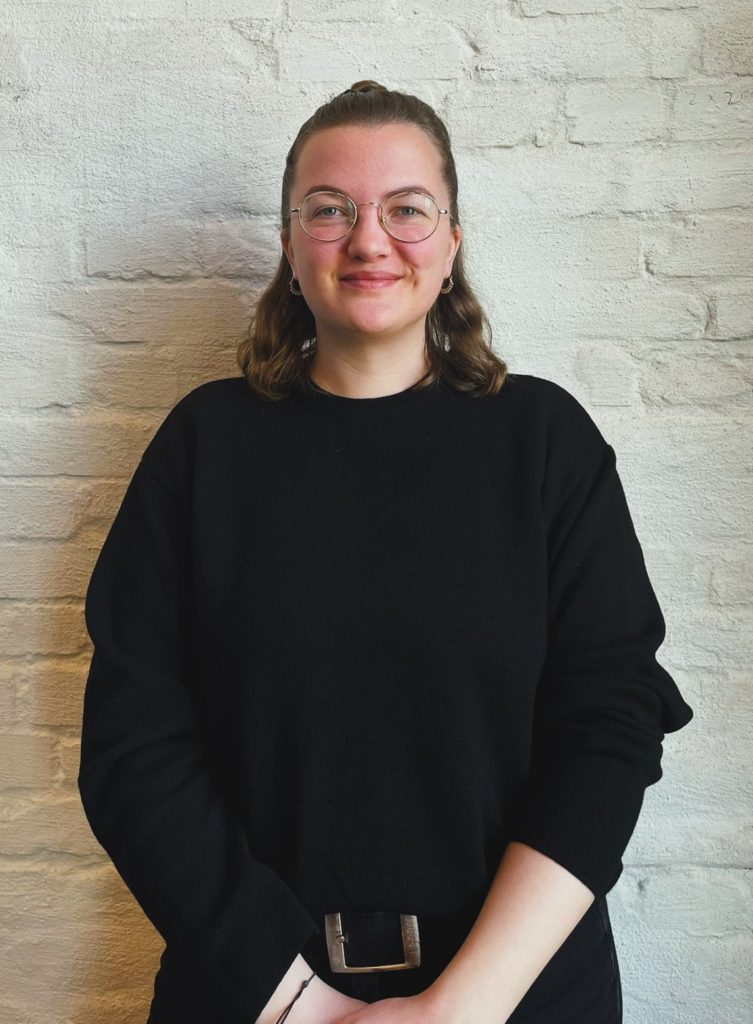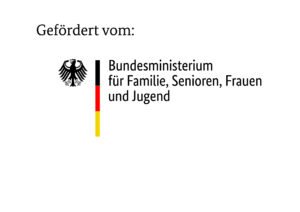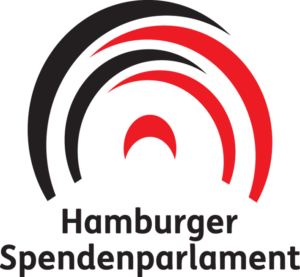Actively campaign for a fairer society by becoming a mentor!
With your commitment, you can make a lasting difference by supporting refugees with the challenges of their everyday lives. Make a difference for those who receive little support.
Mentoring Program
What is beeMentor?
beeMentor is our answer to the question of how we can make it easier for refugee families and individuals to arrive in our society.
In our mentoring programme beeMentor, we have been placing volunteers (mentors) with refugee families and individuals (mentees) since the beginning of 2015. You can take on a mentorship either alone or with another person, for example a friend.
As a mentor, you donate an average of about two hours of your time per week and act as a contact person to help the mentees with various challenges. You set your own boundaries and decide which topics you would like to support your mentees with.
The mentorship is designed individually according to your capacities and the needs of the mentee. It includes, for example, your support with visits to the authorities or making doctor’s appointments, learning German or doing homework, or looking for a job or training place together. Perhaps you will also get to know the city of Hamburg better together.
Mentorships thrive on reliability, mutual respect and a change of perspective. And the focus should always be on helping people to help themselves. After all, the goal is to empower the mentees to find their way independently and confidently within the structures in Germany. In this way, they can exercise their rights and duties and assert their claim to fair participation in society. All this contributes to a stronger and more solidary society..
If you are interested in becoming a mentor, fill out this contact form and tell us a bit about yourself:
For example, you can help with visits to the authorities or arranging doctor's appointments, learning German or doing homework.
Our project management is there to help you with questions and problems during your mentorship and regularly organises joint excursions and cultural events in which you can participate free of charge.
In addition, we offer our mentors participatory opportunities within the association’s work, exchange formats, feedback discussions and, in cooperation with other social organisations, further training.
On the one hand, this ensures that the quality of the project is checked and maintained, and on the other hand, it guarantees efficient and effective volunteering.
Your path to the mentorship!
Every individual can contribute to shaping our society.
This is what mentors say:
5 questions for mentors

By loading the post, you agree to Facebook's privacy policy.
Learn more
Questions & Answers
FAQ
A mentor is a contact person for people who need support, information or orientation in a new environment. Mentoring or sponsorships exist in many areas! For example, in a professional or school context. For us, it’s about you, as someone who knows German society and speaks the language, passing on your knowledge and skills to refugees to make their arrival easier. You do this on a voluntary basis, i.e. you don’t receive any money for it, but donate some of your free time to do something good for society.
The equivalent of a mentor is called a mentee. In our context, this means that the refugees with support needs are your mentees.
The mentoring is intended to help the mentees find their way better in their new environment. In the best case, this means that you help them to help themselves and that your mentees can master more and more challenges on their own over time. It’s about actively counteracting a relationship of dependency and motivating people to go their own way.
But not only the mentees benefit from a sponsorship. You also learn more about yourself through your mentees by getting to know new perspectives on your normality. The associated self-reflection leads you to deal with yourself and your place in this world. Such intercultural and diverse encounters are invaluable for a solidary and open civil society. Your newly acquired intercultural competence will bring you many insights in your professional and private life!
In principle, anyone with the time and inclination can take on a mentorship.
However, since a mentorship is also associated with responsibility, we pay attention to other soft skills and the reasons for your motivation in addition to the general conditions such as German language skills, time and reliability. The decision to become a mentor should not be made lightly, but should be well thought out.
A mentorship should be entered into for several months in order to be able to initiate sustainable developments. As a rule, you should plan about two hours a week for the mentorship. Whether you will meet every week or whether you can also provide digital support will be discussed during the placement meeting and can also be arranged flexibly afterwards.
In Hamburg, there are numerous associations that arrange sponsorships. Often the model is a 1:1 mentorship, in which there is one mentor and one mentee. We mainly arrange family sponsorships. This means that we place 1-2 mentors with one refugee family. Families are diverse, i.e. a family can be a single mother, a nuclear family, an extended family and much more.
Refugee families in particular are exposed to multiple challenges. The mentor supports them in coping with the tasks. This relief automatically has an effect on the rest of the family. We hope that the mentorship will have a greater impact and that the mentor will be able to better assess the dynamics within the family in order to be able to help in a more targeted way.
The number of people in the mentee family is determined before the start of the mentorship in the introductory meeting.
Child protection is very important to us. When you visit families with underage children, it is important that you are aware of a few things beforehand.
Especially with children, reliability, balance and open, empathetic communication are important. Laughing at, overtaxing or patronising, but also underchallenging, inconsistency and neglect can impair the child’s development. These listed behaviours occur in everyday life, so it is all the more important to reflect on one’s own behaviour and to correct it transparently.
The parental authority lies with the child’s parents, despite a possible power imbalance in a sponsorship. Excursions without the parents must be approved by them in writing in advance. Do not try to direct the children according to your ideas, but rather to strengthen and empower them in their abilities and interests.
If you suspect abusive behaviour around the child, never keep your suspicions to yourself. Even if it turns out to be a misunderstanding, the safety of the child comes first. Therefore, please contact us immediately so that we can agree on how to proceed. The “Landesarbeitsgemeinschaft Kinder- und Jugendkultur e.V.” (State Working Group on Child and Youth Culture) has developed a behavioural traffic light on which different types of behaviour are shown according to alarm levels.
Before the sponsorship begins, you must provide us with an extended certificate of good conduct. During the introductory meeting and in regular reflection meetings with our project management, we will always discuss the situation of the children. This is not done because we place you under general suspicion, but in order to be able to guarantee the best interests of the children in our work.
Yes, absolutely!
Since we arrange family sponsorships, it is a rule that one mentor is the contact person for several people. Many people find themselves in this role without taking on a sponsorship in pairs. However, if you think it would be easier for you to do a pair sponsorship with someone you know, we are happy to organise that!
First, you need to fill out and submit the online questionnaire. Take the time to use the questionnaire to ask yourself what your motivation is for becoming a sponsor and what your limits are in the mentorship. This initial self-reflection is important for the rest of the process.
After you have filled out and sent the form, it will be forwarded to our project manager, who will contact you to arrange a first meeting. The interview can take place via video call or in person on site.
During the introductory meeting, you will meet with the beeMentor project manager for about an hour. She will discuss your answers to the questionnaire with you and discuss the possible opportunities and risks of the sponsorship.
The aim of the meeting is to get to know you and to get a feeling for you as a person. As an association, we are responsible for who gets to know the mentees. We take this responsibility very seriously, which is why the interview is an important basis for further placement. At the same time, we want you to be as well prepared as possible for your sponsorship and to think about your limits and wishes in the sponsorship together with us and to get rid of any open questions.
Matching is the process of finding the right family for you. We as an association are not solely responsible for your matching, but often cooperate with the accommodation for refugees directly on site. In Hamburg, the accommodation is organised by Fördern & Wohnen.
Through the questionnaire and the get-to-know-you interview, we were able to get an idea of what is important to you in a sponsorship. Together with Fördern & Wohnen, we will see which family could be a good match for you. Before the first meeting takes place, you will have to fill out some paperwork. Our project management team will be present at the first meeting with the family and will then discuss with you whether or not you can imagine becoming a sponsor.
Before the first meeting, you sign a volunteer declaration from Fördern & Wohnen. In the declaration, personal data will be requested and you agree not to pass on any sensitive data from the volunteer work to third parties. You are then insured against liability and accidents through Fördern & Wohnen. In addition, you will be included in the volunteer register of Fördern & Wohnen and benefit from further training opportunities or the reimbursement of possible travel costs to the accommodation.
In order to be able to start your voluntary work, you have to prove to Fördern & Wohnen that you have been vaccinated against measles. You also have to apply for an extended police clearance certificate. Fördern & Wohnen will give you a form that you hand in at the customer centre. The certificate of good conduct is free of charge, but you have to make an appointment at a customer centre near you. The appointment will take a maximum of 5 minutes.
Since we are not solely responsible for the placement, but cooperate with the agency Fördern & Wohnen, the duration of the placement can vary depending on the accommodation. As a rule, the placement takes between 3 and 6 weeks. We do our best so that you don’t have to wait long and keep you informed about every step!
The first meeting usually takes place in the accommodation of the family or person. Our project manager will be present at the first meeting. At the beginning, she will once again inform you about the association and the voluntary service and highlight what you want to do and what you don’t want to do. Afterwards, the aim is to get a first impression of each other. Afterwards, you will reflect on the meeting with our project manager and decide whether you want to get to know the family further.
You meet with the family about once a week. This can always be a regular date or you can arrange the dates flexibly.
You decide where you want to meet. It is best to decide beforehand whether you would like to visit the family in their accommodation, for example, or whether you would prefer to do something outside. Especially in the beginning, you should suggest what you would like to do during the meeting. Try to motivate the family to make suggestions or ask them what they are interested in. Always make sure that the activities are free of charge.
If you are overwhelmed during your mentoring activity, need tips for your free time or would like to share nice moments, feel free to contact our project manager at any time.
A mentorship is normally set up for six months. However, since support for two to three months is also enriching, this can also be arranged. If you would like to be a mentor for longer, you can of course do so. You will communicate regularly with our project manager about the mentorship and can also contact her if you no longer have capacity.
Life circumstances can change and with them the possibility of maintaining a sponsorship. Then it is important that the end of the sponsorship is accompanied and that everyone involved looks back on the time with a positive feeling.
During mentoring, you build a personal relationship with your mentees. As in any interpersonal relationship, misunderstandings or other conflicts can arise despite good preparation. Then it is important to address these openly and to search constructively for a solution. It is precisely in such situations that you grow! If you have difficulties, talk to our project manager. If you can’t find a solution, we also offer to accompany the discussion with the family or to organise an external supervisor.
If the conflicts cannot be resolved, no one will force you to continue the sponsorship. The last step is to terminate the sponsorship if the previous discussions have not led to any change. In this case, it is important that you talk to our project manager about it.
We regularly organise various exchange opportunities within the project and are known for our Nowruz, summer and St. Nicholas parties.
In addition to these events, we cooperate with the Landungsbrücken Hamburg and the Mentor.Ring, through which you can participate in numerous training courses. Fördern & Wohnen also offers further training.
If you have ideas for your own small projects or actions, contact our project manager and we will consider how we can implement your ideas with our resources!
Your volunteer work often has a positive effect when applying for scholarships or looking for a job.
We are happy to support you on your way and to contribute to the realisation of your goals. Please contact our project manager if you need proof of your volunteer work or a statement from us.
Project Manager
Sina El Basiouni

If you have any questions, feel free to text or call!




